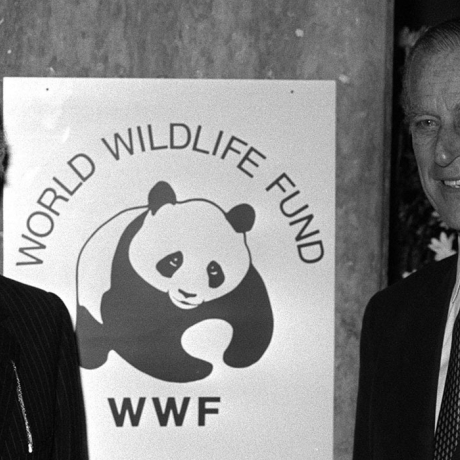The Duke of Edinburgh had a lifelong commitment to wildlife conservation which was best characterised by his relationship with the World Wildlife Fund (WWF).
His Royal Highness was involved with the organisation from 1961 in a variety of roles, from President of the UK branch, to member of the International Board to International President and finally President Emeritus.
At the invitation of Sir Peter Scott, the founding chairman of the World Wildlife Fund, The Duke of Edinburgh became President of the Fund's UK Branch in 1961.
Between 1965 and 1980 he was a member of the Board of Trustees of WWF International. In 1981 His Royal Highness gave up the UK Presidency and became International President until 1996 when he retired and became President Emeritus.
On his election as International President Prince Philip was clear that he did not want the role to be solely nominal and immediately proposed a series of reforms.
He understood that an international organisation needed to have a lean and well-organised administrative structure and reduced the number of members of both the International Board and the Executive Council.
He also proposed the creation of Annual Conferences during which the National Organisations could voice their opinions.
The Duke of Edinburgh was a hands-on leader of the Fund, chairing all meetings of the International Board and Executive Council and travelling widely, often to remote parts of the world, to promote the WWF’s projects and ethos, and using his influence to enlist the support of international Heads of State.
He always listened and considered the opinions of other Board members so that they felt that their views had been respected and were satisfied even if a final decision went against them.
Watch The Duke of Edinburgh host an event for the Alliance of Religion and Conservation at Windsor Castle in 2009:
Throughout the 1950s and 1960s His Royal Highness became interested in the relationship between Science and Religion. In 1965, with the then Dean of Windsor, the Right Reverend Robin Woods, he founded St. George’s House in Windsor Castle, which provided a residential centre where laity and clergy could meet and discuss ideas of mutual interest.
His Royal Highness had long regarded the conservation of nature to be “a moral imperative” and in a speech at a WWF Dinner in Bombay he argued that “Conservation is the only issue that is truly international, inter-denominational, inter-ideological and inter-racial.”
In 1986 to celebrate the 25th anniversary of WWF (the World Wide Fund for Nature) it was arranged for the Annual Conference to be held at Assisi. It was His Royal Highness’ idea to take advantage of the location of Assisi to ask the Head of the Franciscan Monastery to host a meeting of senior leaders of the five main religious communities to discuss what, if any, responsibility they felt for the natural environment as a 'sacred’ entity. The leaders of Buddhism, Christianity, Hinduism, Islam and Judaism agreed that they had a responsibility and a joint celebration was held in the Basilica at the end of the Conference. It was following this meeting that the religious leaders and conservationists agreed to form an informal alliance to promote the cause of religion and conservation.
The Alliance of Religions and Conservation (ARC) was established as a fully-fledged charity in 1995. It exists to help the religions to make their contributions to the conservation of nature according to their beliefs and traditions.



